We must not forget that as we begin to mature and grow in age, our ability to appear young and the feeling of youth will involve a lot more factors besides Human Growth Hormone (HGH), although HGH can be the most important part of anti aging.
 In order to achieve this, exercise, selecting the right kind of food to eat, proper sleep, vitamins and minerals combine as a team to play key roles as stimulants for anti aging.
In order to achieve this, exercise, selecting the right kind of food to eat, proper sleep, vitamins and minerals combine as a team to play key roles as stimulants for anti aging.
Those people who have a balance of all these factors in their lives can foresee themselves towards a healthy and quality filled aging and also reduce the chances of any chronic degenerative diseases such as cancer.
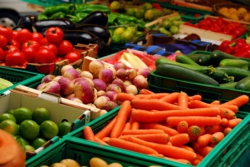 It does not matter whether you are a very young or a person grown in age, but going for nutritious foods is essential for maintaining an exceptionally healthy body along with longer life. That is exactly the reason why I place lot of emphasis on healthy nutrition and making use of anti aging nutrients.
It does not matter whether you are a very young or a person grown in age, but going for nutritious foods is essential for maintaining an exceptionally healthy body along with longer life. That is exactly the reason why I place lot of emphasis on healthy nutrition and making use of anti aging nutrients.
Nutrition will give a proper definition of what you are basically made of as this is considered to be a vital foundation for each and every living organ and cell in a human body.
Nutrition supplies the human body with all the required fuel meant for survival and maintenance. It also supplies energy, strength and vitality and at the same time helps human body fight illness and diseases.
Hunger is considered as only a reason for consuming food. However, the crucial craving for food serves as a human body’s vital communication and conveys the need for having nutrients.
Whenever you plan to consume any natural or nutrient dense foods, you mostly please your body’s need to deliver high quality fuel which further helps in empowering a human body’s immune system to help fight any type of diseases and illness.
Calorie restriction diets for anti aging and longevity?
Here are two sure shot ways of getting anti aging benefits through dietary practice.
1- Reduce calorie intake from the food you consume
2- Consuming high nutrient foods and supplements.
There is also a third option wherein you will require fasting for one day in a week, and reducing calorie intake by having only super foods.
Those who fast for a minimum of one day or more every week are making a wise move, whether they are aware of it or not.
Research and studies conducted on humans as well as animals have proved that reducing calorie intake which is found can help a human body against cardiac ageing & even control cardiovascular illness, some kinds of cancers & other diseases.
There are other surprising benefits where it has been discovered that low calorie intake can even clean out parasites which went unsuspected and were lying in the digestive system.
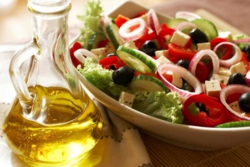 Fasting at regular intervals or even adopting the Okinawa or Mediterranean diets can highly reduce calorie intake, in fact these diets are great to attain longer life span.
Fasting at regular intervals or even adopting the Okinawa or Mediterranean diets can highly reduce calorie intake, in fact these diets are great to attain longer life span.
There have been hundreds of scientific studies and research conducted providing the advantages for reduced calorie intake.
In fact, scientists from Cornell University found their first breakthrough in the year 1935 where they fed two groups of rats, one group with low calories and the other with normal calories.
They discovered that rats which ate low calories food had a life span increase of 33% and suffered less illness as compared to rats which was fed with normal food.
Here is a summary of just a few pieces of the medical evidence
• A July 1996 study in the journal Science concluded that “restriction of caloric intake lowers steady-state levels of oxidative ‘stress and damage, retards age-associated changes, and extends the maximum life-span in mammals.”
• In a May 2003 study published by the Proceedings of the National Academy of Sciences it was found that intermittent fasting in lab animals regulated glucose and neuronal resistance to injury in ways that could extend their lives.
• The Journal of the American Medical- Association featured an April 2006 study in which a group of men and women were placed on a calorie-restricted diet for six months at the end of which the study authors concluded that “our findings suggest that two biomarkers of longevity (fasting insulin level and body temperature) are decreased by prolonged calorie restriction in humans.”
• A twenty-year-long study of aging in rhesus monkeys conducted at the University of Wisconsin, and published in a July 2009 issue of Science, found that those monkeys eating a third less food than control study monkeys aged much more slowly.
• An Archives of Neurology study in February 2009 determined that adherence to the Mediterranean diet with its emphasis on low calorie foods and olive oil resulted in study participants having a reduced risk of mild cognitive impairment and a lower risk of developing Alzheimer’s disease.
• The January 2009 issue of the Proceedings of the National Academy of Sciences carried a study article titled “Caloric restriction improves memory in elderly humans,” which detailed “significant increases in verbal memory scores after caloric restriction,” an effect that was also correlated with decreases in fasting plasma levels of insulin showing a protective effect against several diseases.
Know which foods to eat and which foods not to eat to remain young
Nutritionists prefer dividing food into many different types of groups. My suggestion is that you must plan dividing the food into two different food groups. One of the groups will produce acids when digested while the other group will produce alkalis when digested.
We must remember that our bodies regularly produce waste products which are in a similar fashion as the exhaust which comes out from the silencer of our car.
Waste products are considered to be acidic and are known as toxins. Toxins are the ones that cause pain, tiredness and aging in humans. Therefore it has to be taken into consideration that in the event you wish to have more energy in your body with less body pain and no signs of aging, the best way is to eat food that produces less acid.
 Food which produces acid are proteins and carbohydrates. ‘Foods’ like coffee, tea, sugar, soft drinks, artificial sweetener, preserved meats, flavorings all contain a lot of acid which means it contains plenty of toxins. And pollutants like pesticides and heavy metals are considered to be even worse.
Food which produces acid are proteins and carbohydrates. ‘Foods’ like coffee, tea, sugar, soft drinks, artificial sweetener, preserved meats, flavorings all contain a lot of acid which means it contains plenty of toxins. And pollutants like pesticides and heavy metals are considered to be even worse.

In order to neutralize acid, we have to consume alkali. Some of the main foods that are full of alkalis are vegetables, fruits such as leafy and green vegetables like parsley, cabbage and sprouts.
That is the reason it is always recommended that people must eat plenty of fruits and vegetables to avoid getting aged faster.
Eating raw vegetables are best suited. And when you go opt for steamed food, it is a much better option than getting food boiled (since in steamed food, the minerals and vitamins are retained). You can also go for yogurt and organic cottage cheese.
Foods which usually cause degeneration and aging are:
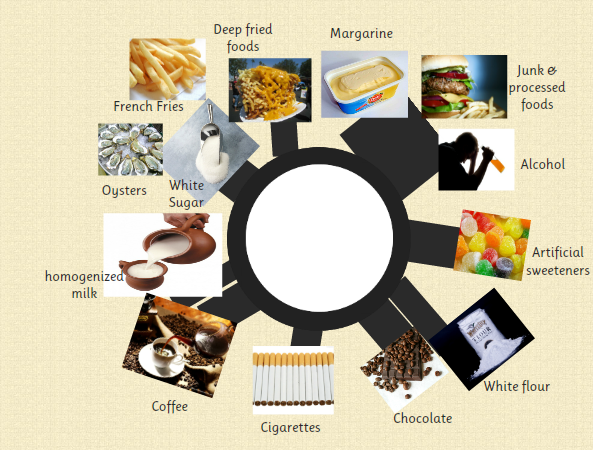
* High levels of carbohydrate
* Sugar
* Milk (especially homogenized milk) and cheese
* Caffeine – Including Tea, Coffee, chocolate, cola, chuppa chups, guarana (Try Chaga – The Coffee Substitute that is very good for you)
* Chocolate (MUCH worse than you ever realized)
* Cigarettes
* White flour
* Microwaved food
* Chemicals such as fluoride (which is a rat poison)
* Artificial sweeteners (especially aspartame / nutrasweet)
* Alcohol
* Processed foods
* Artificial Colorings (as in Gatorade)
* Additives
* Monosodium glutamate (MSG)
* Preserved meat
* Moderate to high levels of meat
* Meat from animals on unnatural diets (eg pork)
* Margarine
* Vegetable oil
* Canola oil
* Cotton seed oil
* Olestra
* Hydrogenated oils
* Oil that is not cold pressed / expeller pressed (use olive oil, butter or ghee)
* Deep fried foods
* Chips / French fries
* Puffed grains
* Soy products other than soy sauce, miso and tofu (eg soy milk & soy oil)
* Meat and eggs raised by `normal’ methods which have many toxins and hormones.
* Seafood which are garbage eaters (eg oysters)
* Foods with high levels of mercury. This includes most fish, such as tuna.
* Aluminium. Especially from aluminium cookware.
* Genetically Modified Food (GMOs). At present this is about 50% of * All soy and corn. Even organic soy and corn can have GMOs in it unless otherwise stated.
* All types of alcohol, especially whiskey, scotch, vodka, and gin bacon and cured meats
* Canned or frozen fruits
* Canned soups
* Fried foods in any form
* All types of gravies
* whole milk
* ice cream
* salted peanuts
* Processed cheese products
* Processed luncheon meats
* Soft cheeses
* Soft drinks and sodas
* Tuna that is canned in oil
* Canned or frozen vegetables with salt additives
* White or brown sugar
* White flour products
* White rice products
* White vinegar
* Fruit syrups
* Aspartame and other synthetic sweeteners
* High fructose corn syrup, which appears not only in many soft drinks but also in thousands of other processed food products.
* Foods high in fat content, including cake, cookies, doughnuts, ricotta cheese, cream cheese, crescents, regular crackers, breaded or fried fish, whole milk ice cream, butter, mayonnaise, sour cream, de-boned or chuck steaks, dark meat from turkey or chicken, bologna, salami, hot dogs, and sausage.
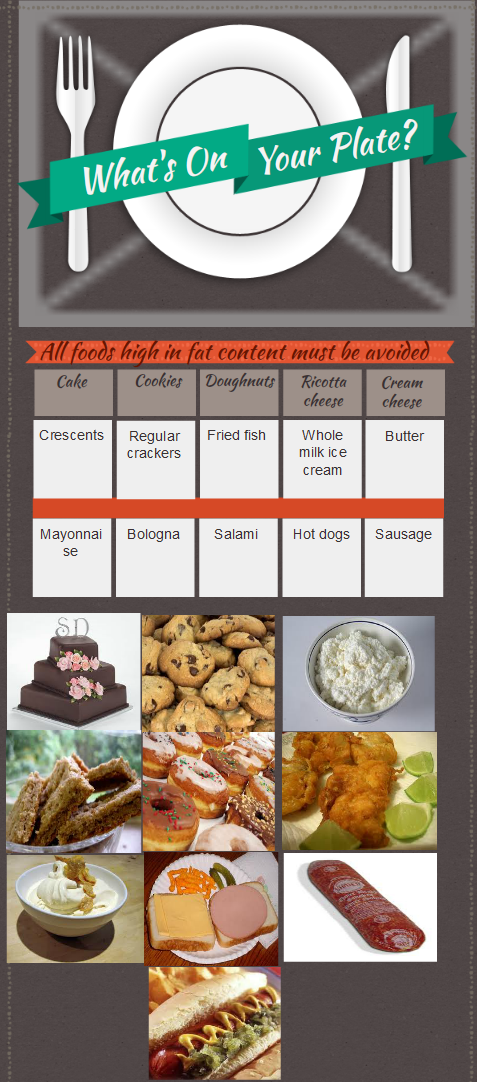
Foods which can help regeneration and anti-aging include
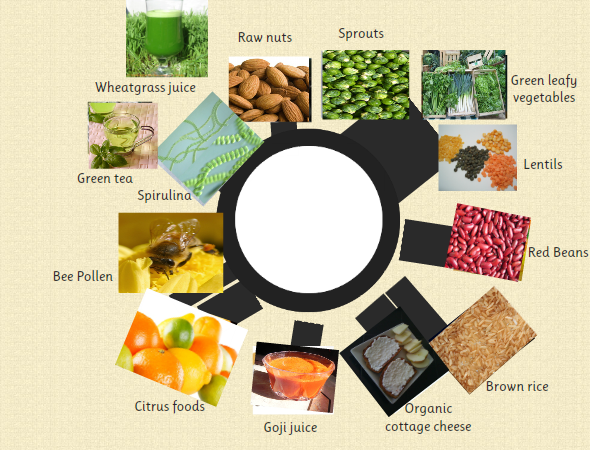
* Chaga. From Siberia. A great replacement for coffee.
* RAW seeds, soaked and sprouted grains. Also raw nuts, but not as much.
* RAW Fruit and vegetables especially sprouts
* Green leafy vegetables
* Lentils – learn Indian cooking to make them interesting
* Beans that have been soaked for 8 hours. (That is, ‘sprouted’. This makes them alkaline)
* Brown rice that has been soaked for 22 hours. This makes it alkaline
* Organic Cottage cheese and yogurt. They are alkalline. The bacteria has changed the original milk.
* Goji Juice & Berries
* Super Food
* Seeds
* Bee Pollen (not for everyone-some are allergic to pollen from some areas)
* Kambucha
* Celtic sea salt
* Spirulina
* Seaweed
* Wheatgrass juice
* Barley greens
* Aloe vera
* Antioxidants (eg vitamin C, vitamin E, pycnogenols, coenzyme Q10)
* Olive oil
* Evening primrose oil
* MSM (organic sulphur)
* Foods with omega 3 fatty acids (eg flaxseed oil) and
* Foods with omega 4 & 5 fatty acids (eg evening primrose and fish oil).
* Gentle sunlight (vitamin D)
* Fulvic Liquid Minerals!!!!
* Cold pressed oils like sesame, sunflower, safflower.
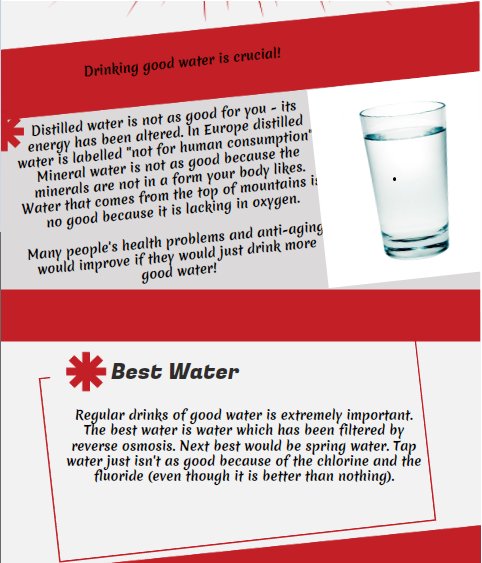
WHY I STRESS THE IMPORTANCE OF CERTAIN FOODS
Whenever possible I recommend vegan or near-vegan diets, eliminating or significantly lowering the amount of animal flesh and animal products that you consume. However, occasional broiled or baked lean meats, fowl, or fish become acceptable when eaten in lower quantities.
In anti-cancer diets and for weight management, vegetables have proven especially beneficial and healthy, especially cabbage, cauliflower, carrots, beans, broccoli, and brussels sprouts. Foods containing natural digestive enzymes, including bromelain from pineapples and papain from papaya are also highly desirable.
You should always avoid fried foods, simple sugars, salt, flour, and any cured meats such as salami, sausage, bologna, pepperoni, canned meats, Spam, hot dogs, and similar foods.
Among other primary foods that we highly recommend to treat or prevent certain aging-related conditions:
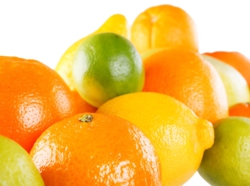 Citrus foods: While also helping to prevent cancer, citrus foods containing bioflavonoids, terpenes, Iimonene, and citrus pectin aid the cardiovascular system while serving as antioxidants.
Citrus foods: While also helping to prevent cancer, citrus foods containing bioflavonoids, terpenes, Iimonene, and citrus pectin aid the cardiovascular system while serving as antioxidants.
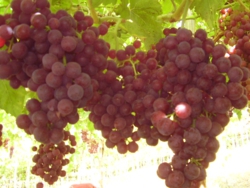 Red grapes: These fruits contain plant flavonoids called “pycnogenol,” also present in pine bark extract. Red grapes serve as one of the strongest antioxidants, also helpful in strengthening bone and cartilage tissue while enhancing immune function.
Red grapes: These fruits contain plant flavonoids called “pycnogenol,” also present in pine bark extract. Red grapes serve as one of the strongest antioxidants, also helpful in strengthening bone and cartilage tissue while enhancing immune function.
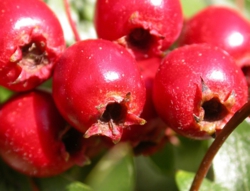 Hawthorne berries: This food and extracts from such fruits help strengthen bones, tendons, cartilage, and cardiac muscle, while serving as a natural treatment for hypertension.
Hawthorne berries: This food and extracts from such fruits help strengthen bones, tendons, cartilage, and cardiac muscle, while serving as a natural treatment for hypertension.
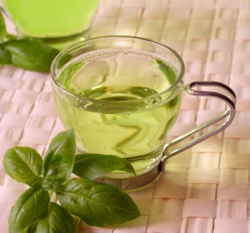 Green tea: Three or four cups per day have long been known to Asians as helpful in preventing cancers-even common killers like lung cancer. Plaxseed Jignan fibers: An excellent hormone regulator, this food source helps protect against breast and prostate cancers.
Green tea: Three or four cups per day have long been known to Asians as helpful in preventing cancers-even common killers like lung cancer. Plaxseed Jignan fibers: An excellent hormone regulator, this food source helps protect against breast and prostate cancers.
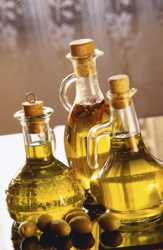 Healthy oils: Selections such as corn, olive, canola, and soy are monosaturated, which is important in the production of good cholesterol. Oat bran and wheat germ: These natural foods help lower “bad cholesterol,” while increasing “good cholesterol.”
Healthy oils: Selections such as corn, olive, canola, and soy are monosaturated, which is important in the production of good cholesterol. Oat bran and wheat germ: These natural foods help lower “bad cholesterol,” while increasing “good cholesterol.”
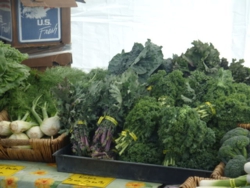 Green super foods: These selections include wheat grass, rye grass, barley grass, and blue green algae, nutrient and trace elements, and are an excellent source of making the body more alkaline than acidic. These foods also combat acidosis, a hallmark of inflammatory conditions and cancer. Remember that active cancers lower the body’s PH and promote acidity, a condition that favors cancer growth
Green super foods: These selections include wheat grass, rye grass, barley grass, and blue green algae, nutrient and trace elements, and are an excellent source of making the body more alkaline than acidic. These foods also combat acidosis, a hallmark of inflammatory conditions and cancer. Remember that active cancers lower the body’s PH and promote acidity, a condition that favors cancer growth
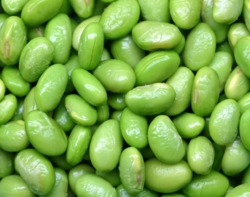 Soybeans: We know that this excellent anti-aging food, which is high in protein, remains a delight to people who prefer to avoid eating meat.
Soybeans: We know that this excellent anti-aging food, which is high in protein, remains a delight to people who prefer to avoid eating meat.
The chemicals in soy contain strong antioxidants, hormone regulators, and cancer-prevention qualities, especially in battling breast and prostate cancers.
Many people eat soy products, thanks to the cancer-therapeutic properties of these foods. (Be sure to avoid genetically modified soybeans by purchasing only certified organic products!)
Healthy dark chocolates: Derived from natural cocoa, chocolate without sugar or milk products serves as an essential antioxidant.

Raw or lightly cooked whole grain cereals
Raw or lightly steamed vegetables and sprouts raw or fresh fruits, including the skin
Lightly cooked beans, lentils, and peas preferably unsalted raw nuts and seeds
Low-fat dairy products, especially low-fat cultured yogurt
Occasional lean meat: fish, or poultry, usually limited to one or two times weekly.